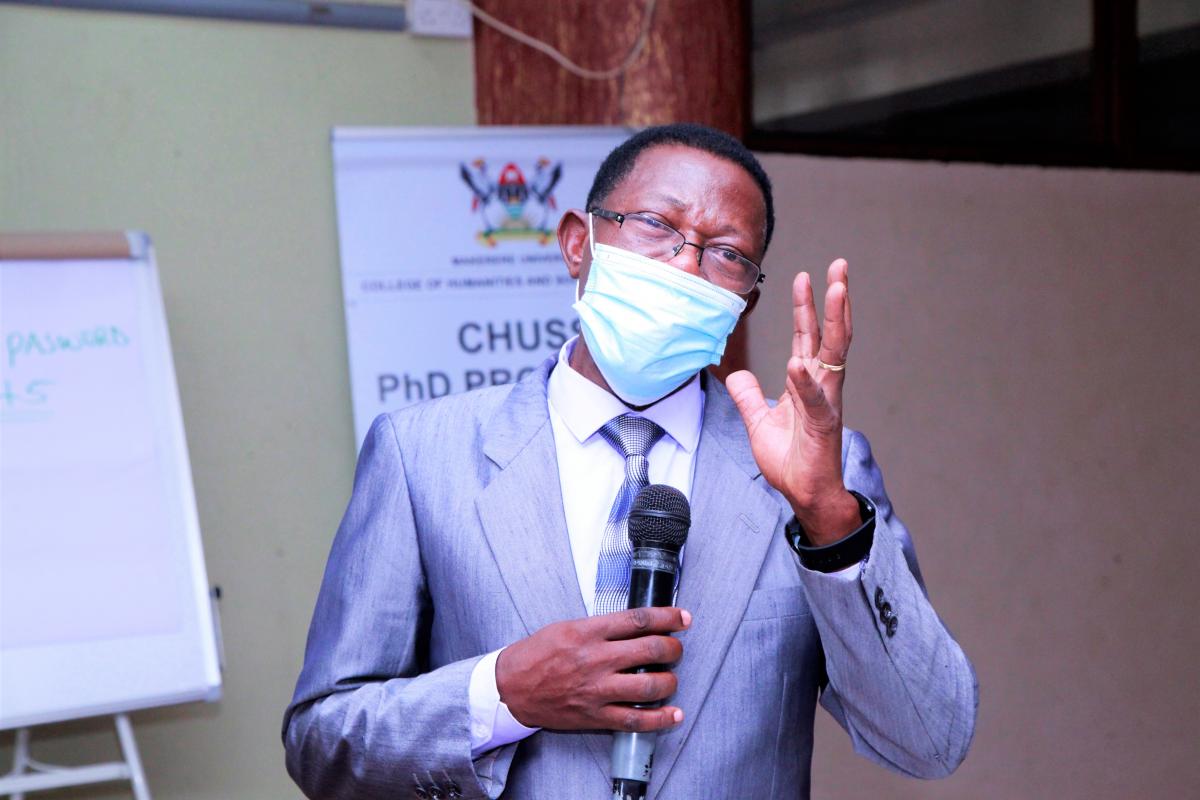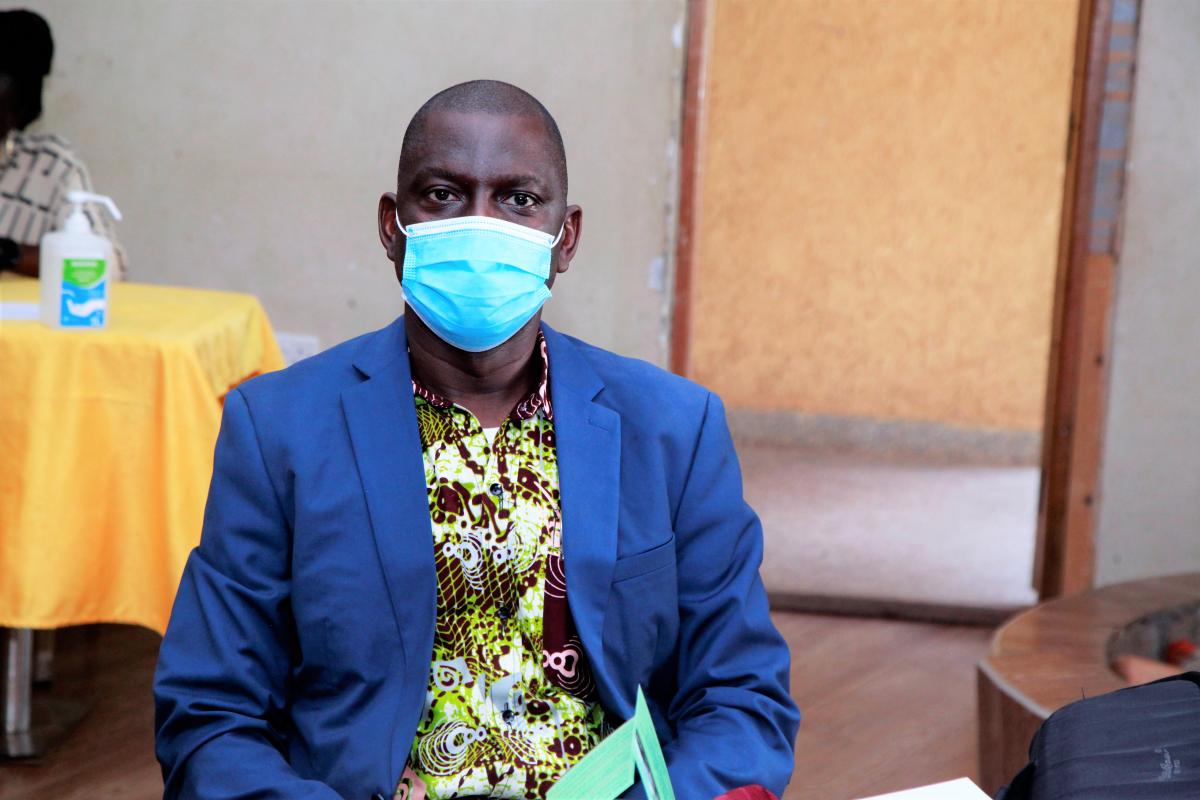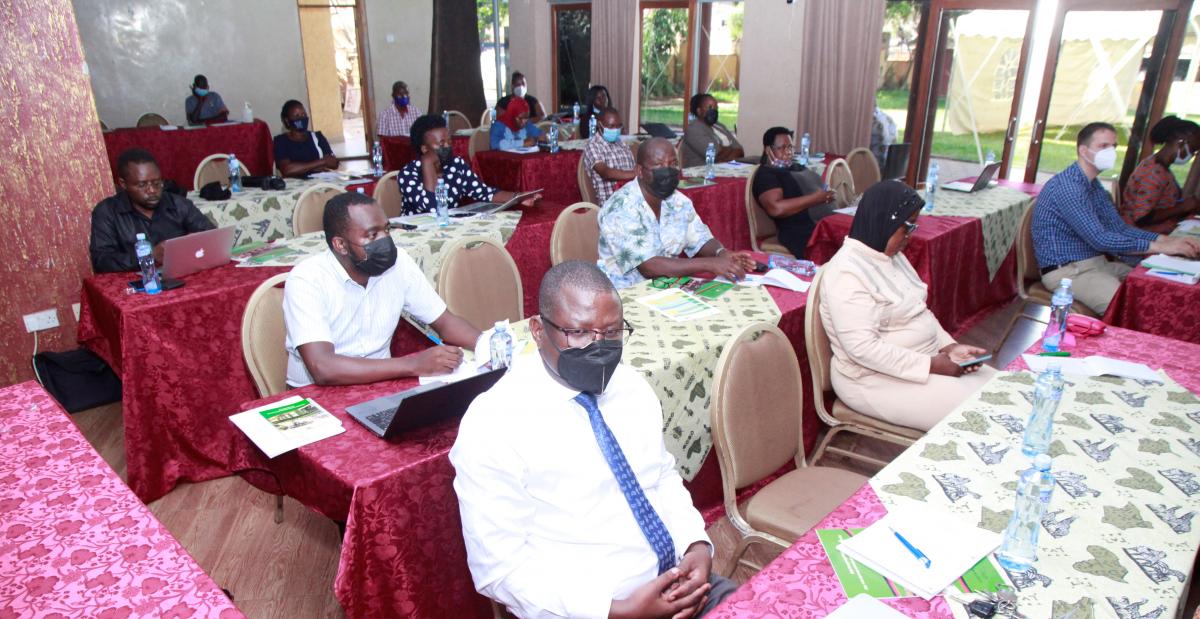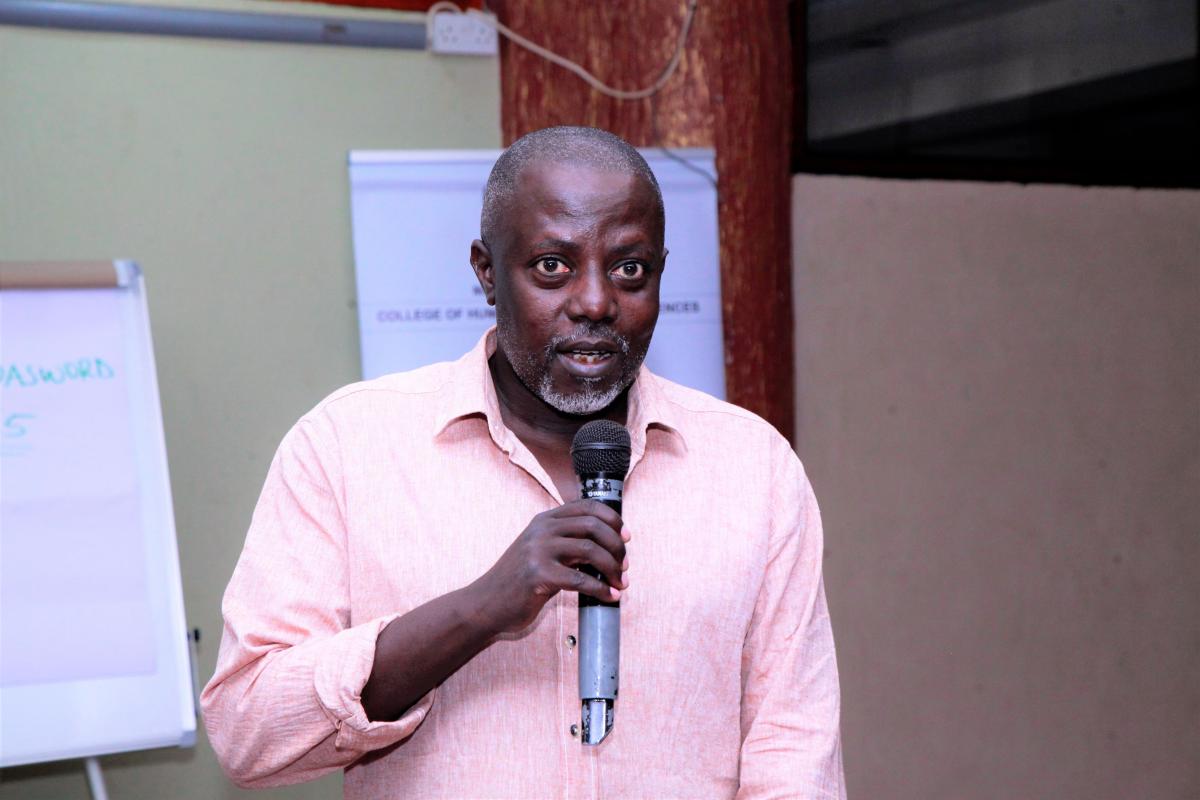
The College of Humanities and Social sciences (CHUSS) on 3rd to 4th March 2022 held its fifth annual Gerda Henkel retooling seminar for supervisors, Heads of Departments and Deans who are mentoring PhD students for 2021 CHUSS Gerda Henkel funded PhD training. The goal of the retooling seminar was to discuss and agree on strategies and practices for ensuring robust and timely mentorship for graduate students.
CHUSS has 312 PhD students from 2010-2021 who have not completed but are registered. Of the 312, 50 are Gerda Henkel and Andrew W Mellon project funded excluding those who withdrew.
In addition to 312 PhDs, CHUSS has Master students close to 2973 minus those whose whereabouts cannot be traced but registered for the first year and left. These statistics exclude the post doc students.

The retooling seminar was officially opened by the Principal CHUSS represented by the Deputy Principal, Dr. Julius Kikooma at the Grand Global Hotel, in Kikooni, a Kampala surbub. The function was also graced by the Makarere University Director, Directorate of Graduate Research and Training Prof. Mukadasi Buyinza.
Dr. Kikooma in his presentation on CHUSS Vision on Graduate training and knowledge production said the matters for discussion were central to the activities of the office of the deputy Principal saying, he was pleased that this exercise was going on.
He thanked the project coordinators Dr.Edgar Nabutanyi and Dr. Lewis Mugumya for outlining the basic information about the projects and the program design for the two days retooling and its genesis.
Dr. Kikooma said the Gerda Henkel Cohort system was modelled based on the experience from a South African University of Stellenbosch. He said the college administration was grappling with the way graduate training runs an open ended system especially the PhD Graduate training.
Dr. Kikooma observed that in the open ended system, students are admitted throughout the year and when they come in, they are handled by the supervisors and just once in while interact with the heads of departments. In addition Dr. Kikooma noted that there was a challenge of lack of structure for the PhD experience and up to date many PhD students admitted do not know the departments in which they have acquired the PhD, know very little of the programs offered in the department and are very disconnected from the intellectual home.
“And we thought this is a big challenge and it does not help the university to build an infrastructure for a good program. So, a cohort model was very welcome because you admit students at a particular point of time and track them throughout their stay on the program.
Since 2017 todate, the college continues to learn from this experience of the cohort system and we are hoping that what we are learning from conducting the cohort system is to become institutionalized and it becomes the way CHUSS conducts its PhDs so that we have a unified system of supporting and providing a conducive environment for the PhD experience”. He said
Dr. Kikooma said the supervisors retooling seminar comes with the new cohort and provides some kind of orientation, bringing new supervisors on board to go through different elements that are important from regulations, project expectations and to ensure that supervisors understand that they are part of the leadership team that is supposed to enable students go through this experience effectively in the department.
While the students are seen as project students, and a special category treated differently, the Deputy Principal advised that supervisors should use the experience from the workshop to treat all other graduate students not funded on programs.
“The graduate statistics in the college should be used to scrutinize all the cohorts to find out where the students who have not finished are. We are making sure that those who have not finished, are the ones that are presented for this coming graduation. But most importantly is that from then on, there is a lot of worry on whether completion rates will continue to be a challenge,” Dr. Kikooma stated.
Dr. Kikoma stressed that the common objective is to ensure that all PhDs that come on any program get through and urged the participants to use the occasion as a point of reflection on what has gone wrong or right and how they can improve and share experiences to help strengthen team work.
Dr. Koikooma stated that the completion of the funded students should be a given without any question. He added that if the college has 300 plus PhDS but only 50 are the ones who are funded under the cohort system, it implies that there are lots of challenges to handle and track other students not under the cohort system.
He expressed the college committed to use the experience of producing many funded students to improving the completion rates of other students.
He told participants that in response to the university strategic direction of becoming research led, the college is going to be more graduate-based and would want to put in place structures that can support seamless movement of students and to see that the college is tracking and understanding what is going on with students to support the units.
University Management drafts reforms to improve graduate training- Prof. Mukadasi Buyinza
Speaking on the second day on the retooling workshop, the Director Directorate of Graduate Research and Training Prof. Mukadsi Buyinza said Makerere is now research led with priority being given to graduate training not only for Makerere but for the country.
Prof. Buyinza reported that the university has increased graduate enrolment standing at 6000 (Masters and PhD) currently with a record of 800 PhDs in training.
Prof. said this has been the university strategic plan direction to build capacity to offer effective supervision to the increased graduate population with CHUSS particularly having ¾ of her staff holding PhDs to supervise graduate students.

He said graduate supervision is critical for building research capacity of the students to be curious and independent thinkers and at the centre of research training. He said the university has senior academics with required skills and competence, who need to meet early career researchers to mentor Masters and PhD students.
Prof. Buyinza stated that whereas undergraduate is about teaching, graduate training is about research and any successful graduate training depends on effective supervision and supportive policies and regulations and therefore critical that university units conduct trainings of this nature.
“Supervision styles change with circumstances. Now we are in the digital era and therefore the supervison approaches and options needs to change. Therefore, it means that as a university we need training and retooling. I commend CHUSS that organized this retooling seminar for its staff because it will get to know the most current supervision styles and also for the reason that research environment has changed for instance we are talking about e-supervision”, the professor said.
Prof. Buyinza disclosed that it is now a university requirement that all appointed staff sign a confidentiality clause and a conflict-of-interest declaration form to show they do not have a conflict with students they have been appointed to supervise.
He said the university has noted that compromised supervisors in most cases do not give due judgment to the quality and that without a conflict-of-interest policy form signed one cannot be held legally accountable incase of abuse and externalization of the report before examination process are completed.
The Director also said, research deals with data and it is important that whoever is in the chain processing of examinations ensures confidentiality and integrity to safeguard student-supervisor relationship.
Prof. Buyinza also said it is Makerere’s strategic vision that the university internationalize the graduate training which goes with efficient systems and procedures including examinations. He said the university has taken a decision under the rapid response initiative scheme to reduce the examination time.
Prof. Buyinza also reported that, although thesis examination is an academic service, it is the management’s considered view to give a honorarium since it requires quality time, commitment and reading widely about the subject.
“We are suggesting a revision of the rates and timeliness of the payment such that once one submits a thesis report, he or she moves to the bursar and draw the allowance and this should be instant to enhance commitment and a feel that the university appreciates staff time given to thesis examination”.
This allowance according the director will be given to all parties involved in the process of thesis examination including interna and external examiners, doctoral committees etc.
The Director also said management is revising the time for thesis examination on reason that many students were taking long because the examination process is not efficient.
“For example, the PHD theses we are giving it a maximum of one month, then, the masters thesis we want to give it an examination time of two weeks which we believe is adequate to give a fair assessment and this will expedite and enhance our completion time and throughput. Now, there will be no justification for seeking for extension if the thesis is examined in time.” Prof. Buyinza said.
In her closing remarks the Principal CHUSS Prof. Josephine Ahikire appreciated prof. Buyinza for always being ready to guide the college.
The principal pledged to keep the PhD output high saying, the heads and deans were working very hard and were committed to respond to the guidance being provided.
“We are really a committed team to streamline the training of the graduate program. It is graduate training that will make us Makerere university different from other universities that are always aligning and benchmarking Makerere university”, Prof. Ahikire said.
The project coordinator from the Department of Literature and Communication Dr. Edgar Nabutanyi said the seminar was an interaction between the supervisors on the Gerda Henkel 2021 PhD Cohort who reported in 2022 due to interruptions caused by COVID 19.

Some of the supervisors according to Dr. Nabutanyi had been on the previous seminars, some are graduates on the Gerda Henkel project while others were in the process of preparing them to graduate and were expected to learn from the discussions to make them better supervisors.
“The idea of the retooling seminar was predicated on the understanding that previously PhD training in Makerere by research was an individual affair between the PhD student and the supervisor and when the Head of Department was in good mood he would perhaps inquire what he was doing.
With the Gerda Henkel funding, we though that we would use a cohort method of training and this cohort method world necessitate running and rerunning certain things in supervision.
So that is why we collectively before the beginning of the cohort come together as supervisors, project coordinators, as administrators to talk and chat a way around how we can help the candidates do their work within the speculated time with as little disruptions and as little chaos as possible” Dr. Nabutanyi explained
About Gerda Henkel
Gerda Henkel is German charity organization based in Germany which funds PhD not only at Makerere but also in South Africa and by 2020, they had worked on a cohort model with the Graduate school of Stellenbosch university. In 2016 they came and meet the leadership of the CHUSS and asked staff to submit an application for funding for a cohort system based on what the Graduate school was doing in Stellenbosch.
In 2017 the grant was awarded to Makerere university for 10 PhDs and in 2018 awarded more 20 and in 2019, they asked Makerere university to apply for extension and awarded an additional funding for 30 PhD funding running up to 2025. At the end, CHUSS is expected to have trained 60 PhDs both from Uganda and Sub-Saharan citizens from Zimbabwe, Malawi, Ethiopian, Nigeria with Ugandan majority.
The Gerda Henkel Fellowship funds tuition for the students for the three years paid directly to the Government of Uganda through Uganda Revenue Authority. It also funds a living stipend to students for the three years.
Starting with the 2020 cohort the fellowship pays for research, conference travel for students but since 2017 payment has been made for research workshops like the retooling seminars and students’ workshops while departments and schools are also funded to organize doctoral committees and similar activities.
